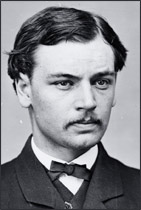
Now that we’re in the midst of celebrations on the 150th anniversary of the Civil War, I think it’s an excellent idea for all students of history to closely examine the causes and consequences of that conflict. Last year I hear a friend of mine state quite vehemently that the Civil War was not about slavery, it was about succession and states’ rights.
In discussing anything with this particular friend, it is a good idea to make liberal use of the phrase, “You’re partially right.”
When somebody says the civil war was about states’ rights and succession, I say, What were they succeeding about? When they say the cause was economic, I say, what was the South’s economy based on? The key issue, in my mind, was the EXPANSION of slavery. Lincoln and the Republican party hated slavery but could tolerate it where it already existed. Their platform was to be unalterably opposed to any expansion of the “peculiar institution” into further territories.
In 1820, Congress thought they’d settled the issue by declaring there would be no slavery north of the line 36 degrees. It would allow slavery, but nowhere north of the current northern boundary of Oklahoma. 25 years later, America’s seizure of the northern half of Mexico reopened the issue. Henry Clay and Daniel Webster engineered the Compromise of 1850 that California would be a free state and slavery would be allowed into the new territories (however, as a practical matter, Clay knew that the land in those areas would be totally unsuited for a plantation society). Throughout the 1850s, some ambitious pro-slavery factions sponsored filibustering expeditions to seize Caribbean islands and parts of Central America to further expand slavery.
When Lincoln ran for president in 1860, he made his position clear: he was resolved to save the union. If he could do it by freeing all slaves, he would do so, if he could do it by freeing no slaves, he would do so, and if he could do it by freeing some and not others, he would do that as well. The statement might make Lincoln seem wishy-washy, but we must take into account what he did not say: he would not allow for the expansion of slavery, even if it meant fighting the bloodiest war in American history.
When Lincoln won the election of 1860 (with only 42% of the popular vote but a clear majority of the Electoral College), southern states, starting with SC in December 1860, started seceding from the Union. Lincoln made it clear he would not agree to peaceful succession. Fort Sumner followed, and 4 years later, 600,000 Americans were dead. So was the institution of slavery. The Union still stood.
For anyone who argues that slavery was not the key issue of the civil war would do well to consider the case of Confederate General Patrick Cleburn. He was born in Ireland in 1828, immigrated to the US at the age of 20. At the outbreak of the he war proved himself to be an extraordinarily talented soldier, rising from private to major general in just 3 years. On January 2, 1864, General Clayburn attended a meeting of senior officers of the Army of Tennessee, where he circulated an essay he’d written. Clayburn first pointed out that the Confederate cause was in a very bad way, a fact which no competent soldier could deny: Vicksburg had fallen, federal troops had taken Chattanooga and were poised to attack Atlanta, and the Confederate Dollar, which had been worth 40 cents US currency, could now be had for six cents. Confederate prospects were indeed bleak.
Cleburn pointed out that the Confederate’s most serious problem was a lack of manpower. Again, a self-evident proposition. He then proposed a solution which left his fellow officers speechless. He proposed any slave who volunteered to fight for the confederacy should receive freedom for themselves and their families. After Cleburn finished his presentation, the silence was deafening. One party present said it was as if someone had told a grossly inappropriate joke in front of a group of church deacons.
Ironically enough, several months later, Robert E Lee broached the subject of arming blacks in return for their freedom, as did Cabinet member Judah Benjamin (who had been a plantation owner but had sold it and his slaves before the war—good timing on his part).
On March 13, 1865, the Confederate Congress actually acted on Clayburn’s idea. Clayburn sadly had been killed in action four years earlier. By that time, however, the Southern cause was well and truly lost. Five days later, the Confederate Congress adjourned for the last time, and 15 days after that, Lee evacuated Richmond, the Confederate Capital. Comparisons between the Confederate cause and that of the Nazis 80 years later because they carry some highly emotional baggage. But the Confederate congress’ action that late in the day reminds me of Himler’s efforts to use Jewish concentration camp inmates as bargaining chips to secure his own safety. It’s a far-fetched historical “what-if” to wonder if Congress had manumitted slaves earlier in the war, and it’s useless. Slavery was the raison d’être of the Confederacy.








